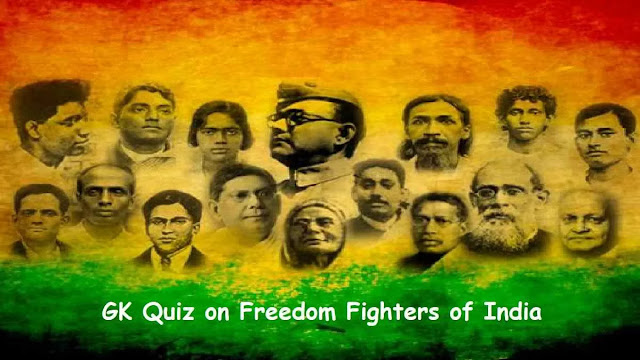Top-10 GK Questions and Answers Quiz on Freedom Fighters of India Part-01
The canvas of Indian history is
adorned with the vibrant hues of the Freedom Struggle, a pivotal epoch that
witnessed the unwavering determination of numerous souls who valiantly aspired
for India's liberation from the clutches of British rule. In our quest to
unravel the intricacies of this defining chapter, we invite you to partake in
an interactive journey – a question-and-answer quiz that not only promises an
enjoyable experience but also serves as a conduit for acknowledging the
profound sacrifices of our forefathers.
01. Who was the leader of the Indian National Congress during the non-cooperation movement in 1920-22?
a) Mahatma Gandhi
b) Jawaharlal Nehru
c) Subhas Chandra Bose
d) Sardar Patel
Answer: a) Mahatma Gandhi
Explanation: Mahatma Gandhi was the leader of the Indian National Congress during the non-cooperation movement. He played a pivotal role in mobilizing masses against British rule through non-violent civil disobedience.
02. Which event marked the beginning of the organized struggle for Indian independence in 1857?
a) Jallianwala Bagh Massacre
b) Dandi March
c) Sepoy Mutiny
d) Quit India Movement
Answer: c) Sepoy Mutiny
Explanation: The organized struggle for Indian independence began with the Sepoy Mutiny of 1857, also known as the First War of Independence, against the British East India Company's rule.
03. Who coined the term "Quit India" during the Quit India Movement in 1942?
a) Jawaharlal Nehru
b) Mahatma Gandhi
c) Subhas Chandra Bose
d) Sardar Patel
Answer: b) Mahatma Gandhi
Explanation: Mahatma Gandhi coined the term "Quit India" as the slogan for the Quit India Movement, which demanded an end to British rule in India.
04. The Simon Commission, which sparked protests in India, was appointed in which year?
a) 1919
b) 1927
c) 1935
d) 1942
Answer: b) 1927
Explanation: The Simon Commission was appointed in 1927 to review and suggest constitutional reforms for British India. It lacked Indian representation, leading to widespread protests.
05. Who was the first woman president of the Indian National Congress?
a) Sarojini Naidu
b) Annie Besant
c) Indira Gandhi
d) Vijaya Lakshmi Pandit
Answer: a) Sarojini Naidu
Explanation: Sarojini Naidu was the first woman president of the Indian National Congress. She played a significant role in the Indian independence movement and was a prominent political figure.
06. Which Indian leader is known for his role in the Champaran Satyagraha and Khilafat Movement?
a) Subhas Chandra Bose
b) Bhagat Singh
c) Maulana Abul Kalam Azad
d) Mahatma Gandhi
Answer: d) Mahatma Gandhi
Explanation: Mahatma Gandhi played a crucial role in the Champaran Satyagraha, where he supported farmers against oppressive indigo plantation policies, and the Khilafat Movement, which sought to address concerns of the Muslim community after World War I.
07. The Rowlatt Act, enacted in 1919, empowered the British authorities to:
a) Implement educational reforms
b) Arrest and detain Indians without trial
c) Introduce economic policies
d) Grant greater autonomy to provinces
Answer: b) Arrest and detain Indians without trial
Explanation: The Rowlatt Act gave the British government the authority to arrest and detain individuals without trial, leading to widespread protests and contributing to the anti-colonial sentiment in India.
08. Who was the leader of the Indian National Army (INA) during World War II?
a) Subhas Chandra Bose
b) Bhagat Singh
c) Lala Lajpat Rai
d) Jawaharlal Nehru
Answer: a) Subhas Chandra Bose
Explanation: Subhas Chandra Bose led the Indian National Army (INA), formed with the aim of liberating India from British rule with the help of Axis powers during World War II.
09. The Jallianwala Bagh Massacre occurred in which city in 1919?
a) Amritsar
b) Delhi
c) Lahore
d) Mumbai
Answer: a) Amritsar
Explanation: The Jallianwala Bagh Massacre took place in Amritsar, Punjab, where British troops, under General Dyer, fired on a peaceful gathering, resulting in a tragic loss of lives.
10. Who became the first Prime Minister of independent India in 1947?
a) Jawaharlal Nehru
b) Sardar Patel
c) Rajendra Prasad
d) Maulana Abul Kalam Azad
Answer: a) Jawaharlal Nehru
Explanation: Jawaharlal Nehru served as the first Prime Minister of independent India from 1947 to 1964, playing a crucial role in shaping the nation's early years.



0 Comments
Post a Comment
Please do not enter any spam link in the comment box.